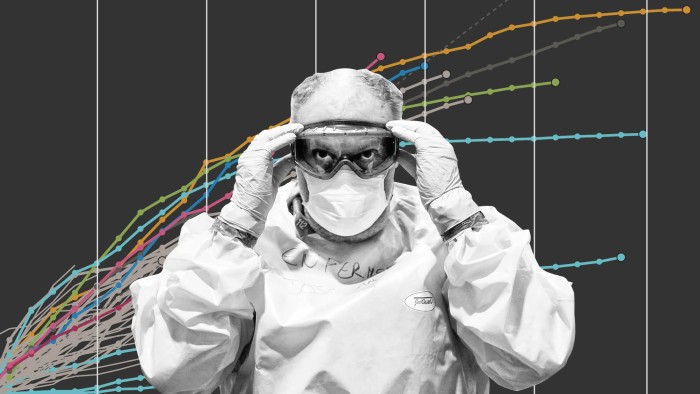Pfizer-BioNTech trial data show vaccine to be even more effective

Roula Khalaf, Editor of the FT, selects her favourite stories in this weekly newsletter.
Pfizer and BioNTech said they would submit their Covid-19 vaccine for US and EU emergency approval “within days”, after new data showed it was even more effective than previously reported.
The jab was found to have an efficacy rate of 95 per cent, the companies said, matching results released this week by vaccine rival Moderna. Both shots are likely to be approved before the end of the year, boosting hopes the world will be able to turn a corner in the battle against coronavirus.
“The study results mark an important step in this historic eight-month journey to bring forward a vaccine capable of helping to end this devastating pandemic,” said Albert Bourla, Pfizer chief executive, adding that the companies were sharing the data with regulators around the world.
In global phase 3 trials involving more than 43,000 people, 170 were observed to have contracted coronavirus, out of which 162 had been given a placebo, the companies said. Just eight of those who had received two shots of the BioNTech-Pfizer vaccine developed the disease and only one became seriously ill, while nine of the placebo group developed severe Covid-19.
In the Moderna vaccine trial, which released its first set of results on Monday showing an efficacy rate of 94.5 per cent, no participant who received the vaccine developed severe Covid-19. Eleven participants in its placebo group developed severe symptoms.
Crucially, the BioNTech-Pfizer shot was almost as effective in people over 65, who are more vulnerable to disease and who are sometimes less responsive to vaccination. The vaccine performed similarly well across different racial and ethnic groups and the trial identified no serious safety concerns.
The trial has also now met the US Food and Drug Administration’s requirement for the monitoring of side effects, having studied the reaction of participants for an average of two months after the second jab. Based on analysis of a randomised group of 8,000 participants, the most common significant side effect was fatigue, affecting 3.8 per cent.
Ugur Sahin, chief executive and co-founder of BioNTech, said the “mostly mild to moderate side effects” may be because of the “relatively low dose”.
Mr Sahin said the vaccine showed how the technology used to build it — messenger ribonucleic acid — could create an entire “new drug class”. In contrast to some traditional vaccines, which tend to deliver doses of a weakened or inactivated virus to provoke an immune response, messengerRNA is used to instruct a cell to produce a viral protein and teach the immune system to react.
Recent surges in coronavirus in different parts of the world fuelled a leap in the number of cases among trial participants, enabling the assessment of the vaccine’s efficacy to be refined. Only 94 participants in the trial had developed Covid-19 before the start of last week, when the companies said the vaccine had shown an initial efficacy rate of more than 90 per cent.
Emer Cooke, head of the European Medicines Agency, said the EU regulatory body wanted to make the approval process “as efficient and effective as possible”.
“We're very hopeful that we'll be able to have an opinion before the end of the year,” she said at a virtual healthcare conference on Wednesday.
The BioNTech-Pfizer trial has enrolled participants in the US, Germany, Turkey, South Africa, Brazil and Argentina. Approximately 41 per cent were aged between 56 and 85. The companies will continue collecting safety and efficacy data for two years.
The relative effectiveness of different Covid-19 vaccines is likely to become increasingly significant as more companies submit potential jabs for approval and governments scramble to buy doses. Pfizer and BioNTech have said that they can manufacture 50m doses of their two-shot vaccine this year, and a further 1.3bn in 2021.
In contrast to Moderna’s vaccine, which can be transported at minus 20C, the BioNTech-Pfizer shot currently needs to be kept at approximately minus 75C during transit, complicating distribution. Moderna has said it intends to file for approval in the US in the “coming weeks”.
Latest coronavirus news

Follow FT's live coverage and analysis of the global pandemic and the rapidly evolving economic crisis here.
As the Pfizer-BioNTech and Moderna vaccines look set to receive emergency approval in the coming weeks, attention is turning to distributing the doses that have already been manufactured.
Every US state will receive a shipment of Covid-19 vaccines within 24 hours of the country’s drug regulator issuing an emergency use authorisation, according to plans drawn up by Operation Warp Speed, the government programme designed to accelerate development and distribution of a vaccine.
“All of America must receive the vaccine within 24 hours,” said General Gustave Perna, who is in charge of distribution for the programme, in a press briefing on Wednesday.
“This is incredibly important: the fair and equitable distribution of the vaccine throughout the country simultaneously. There are no ‘haves’ and ‘have nots’.”
Comments